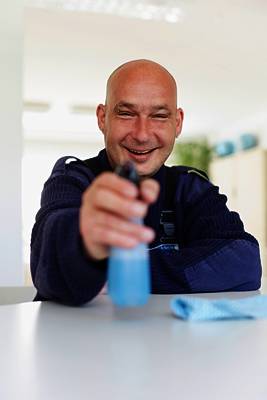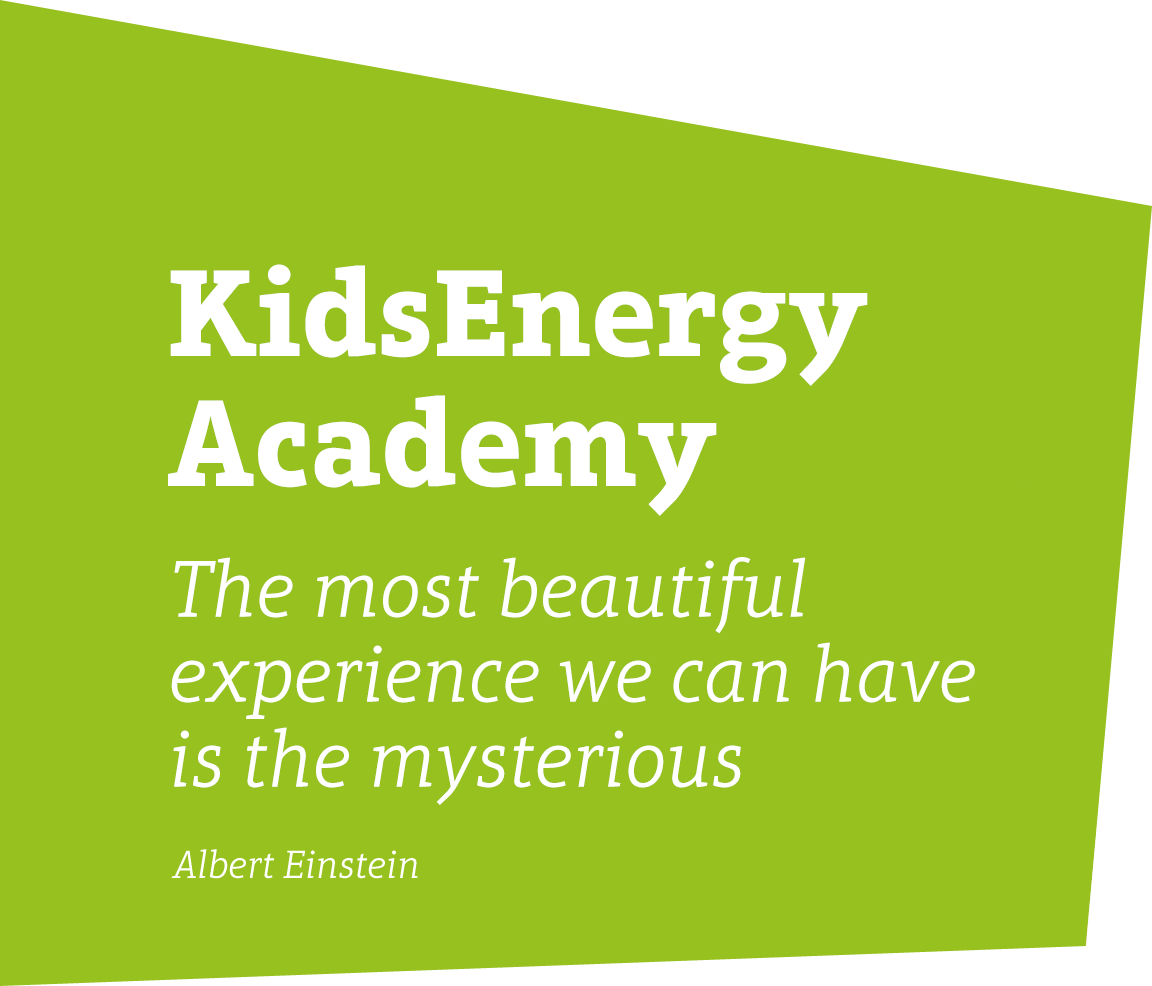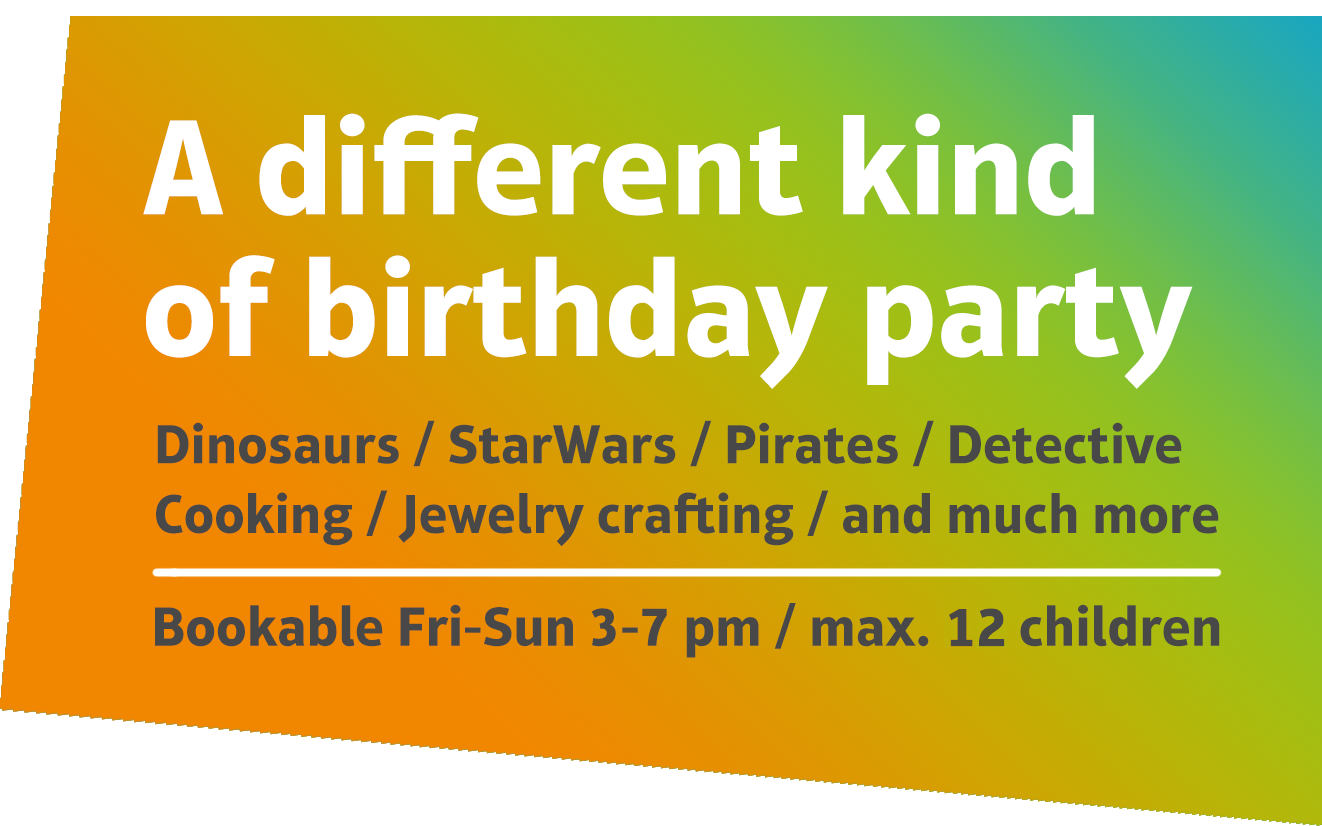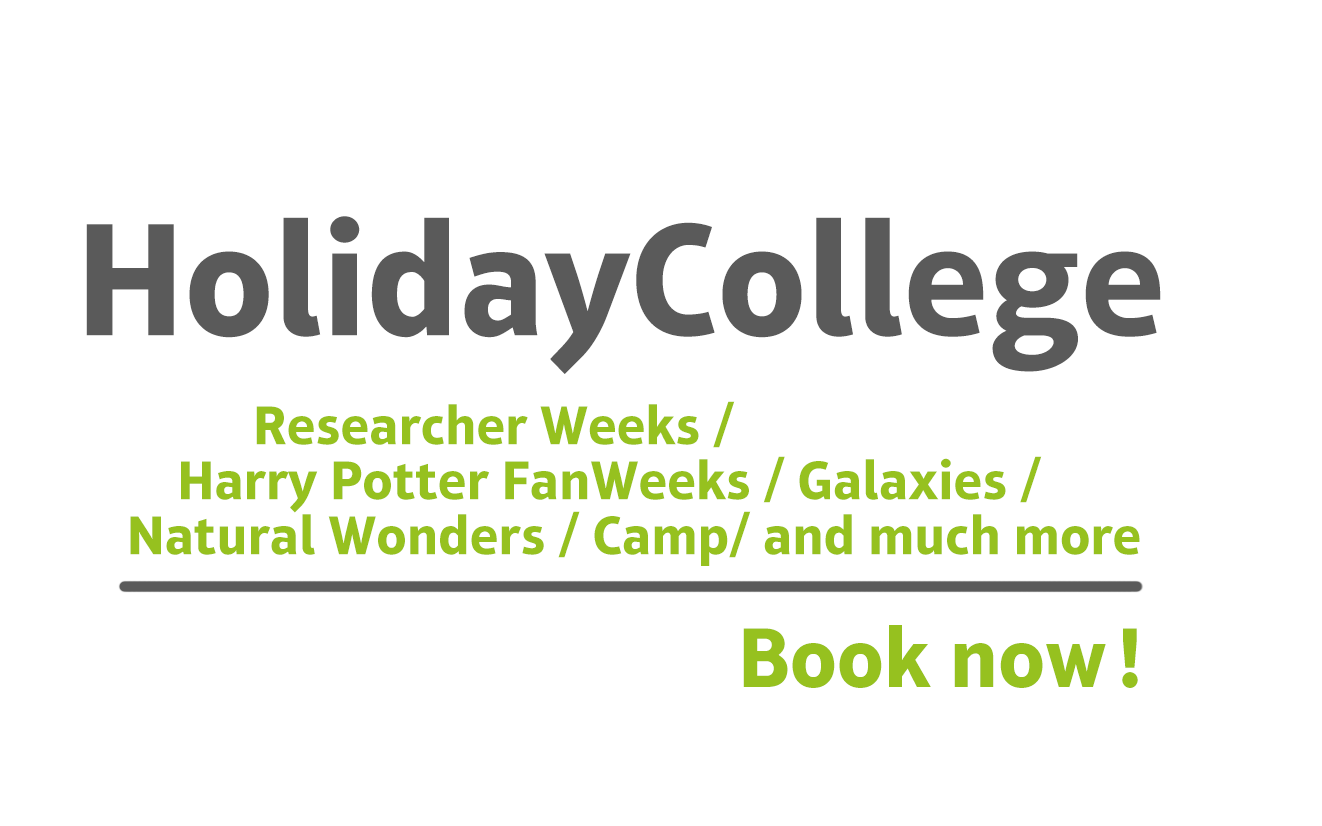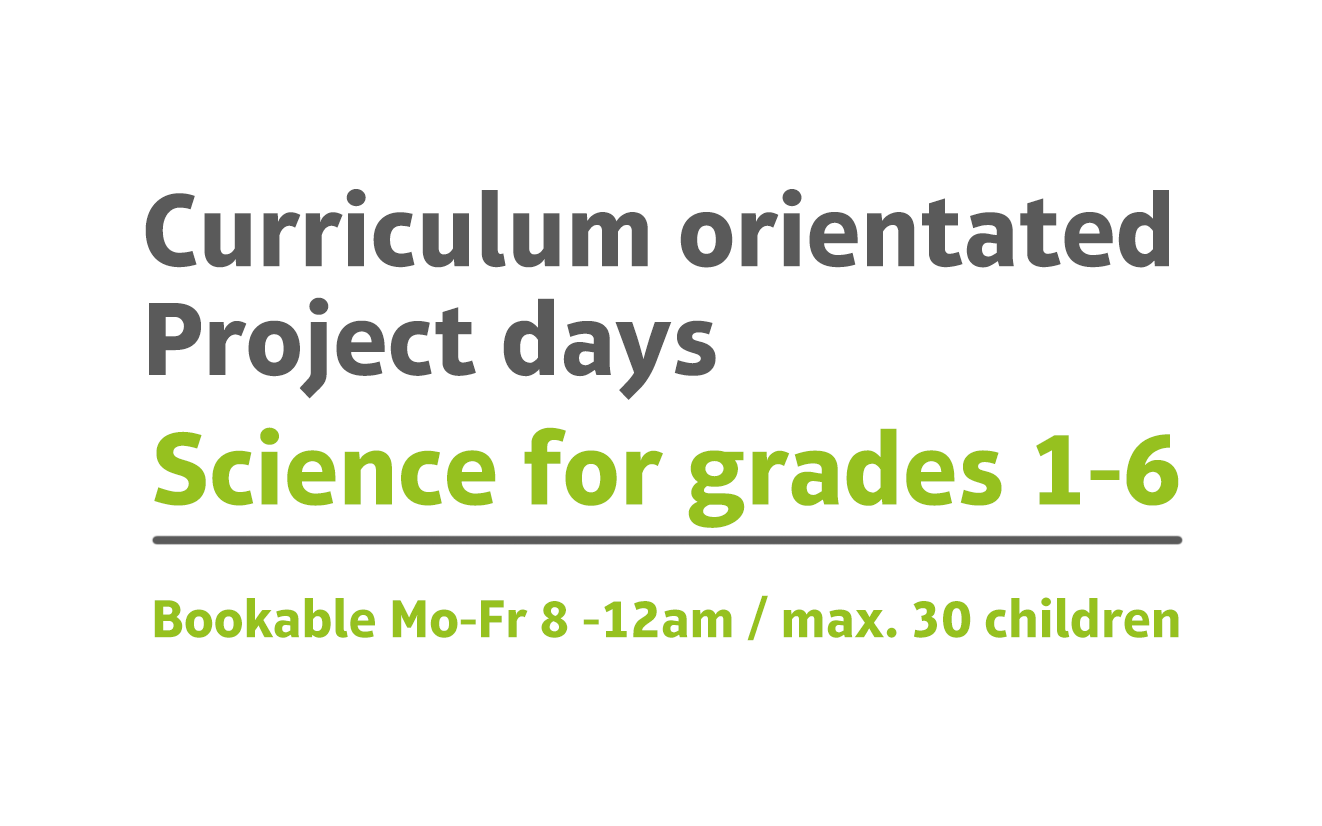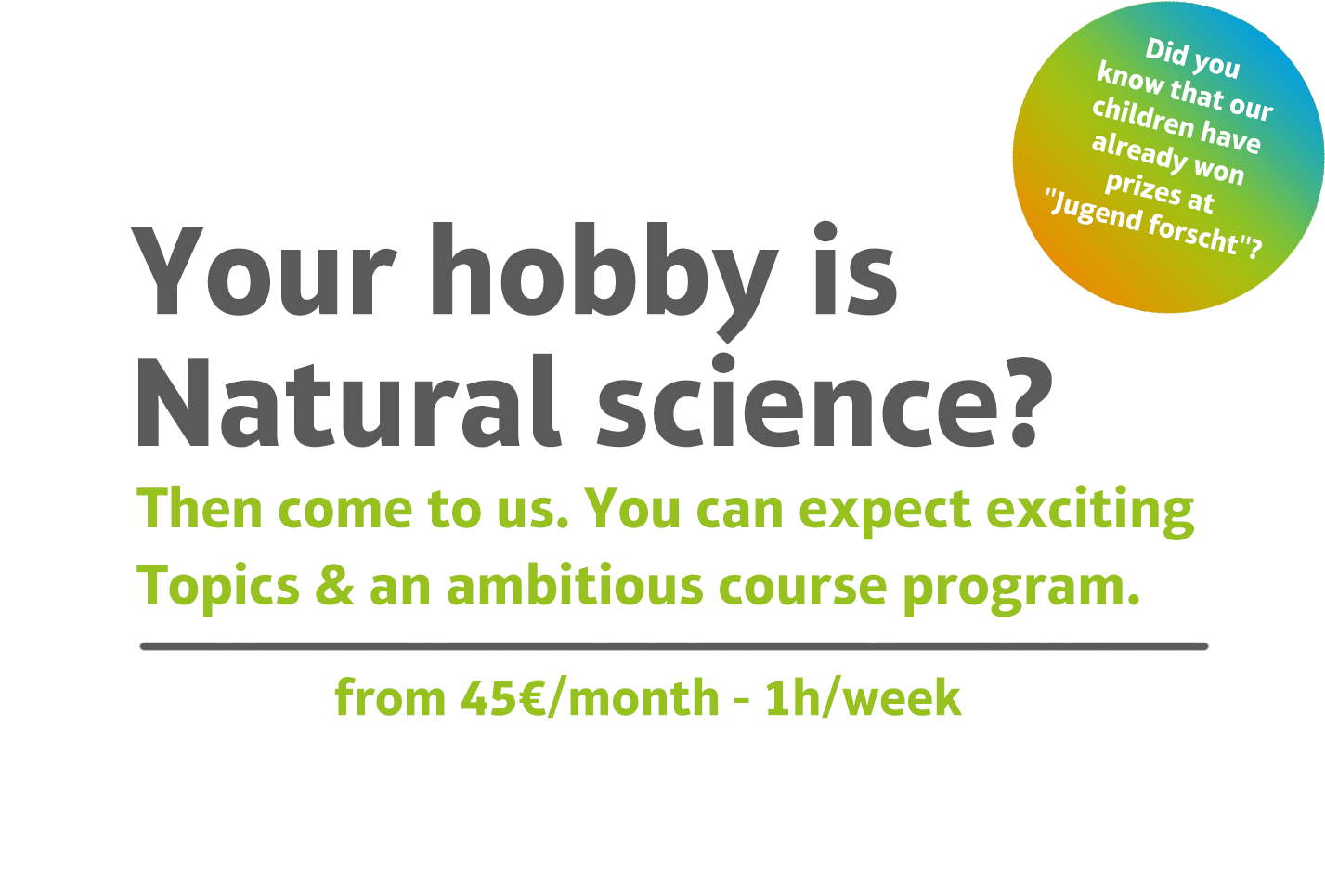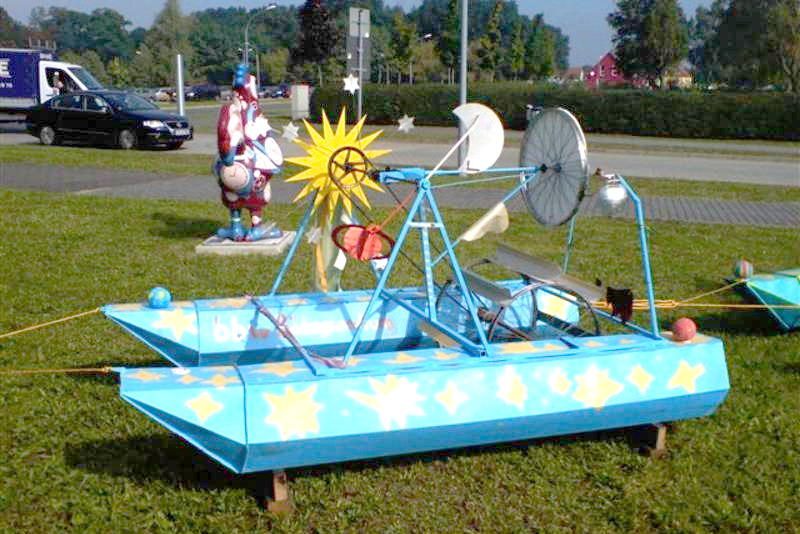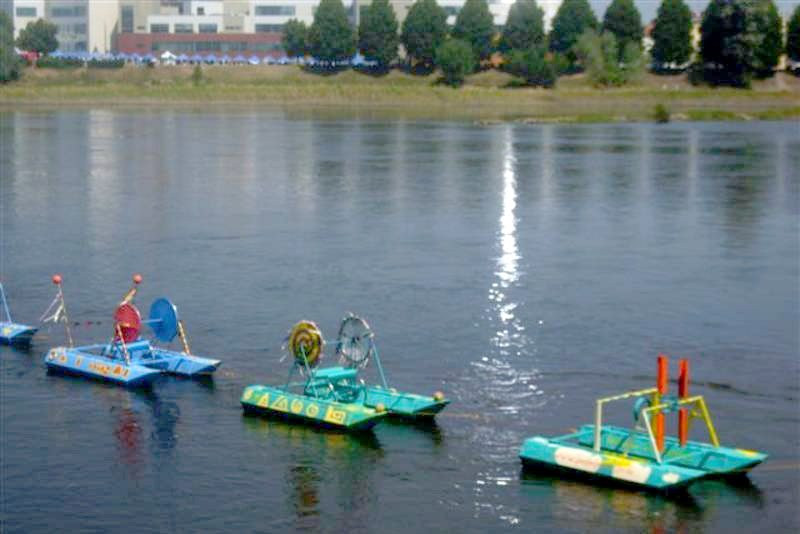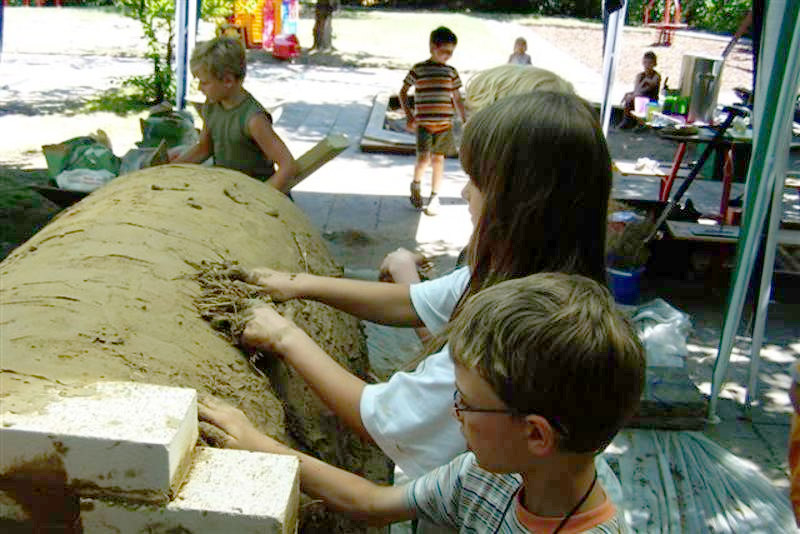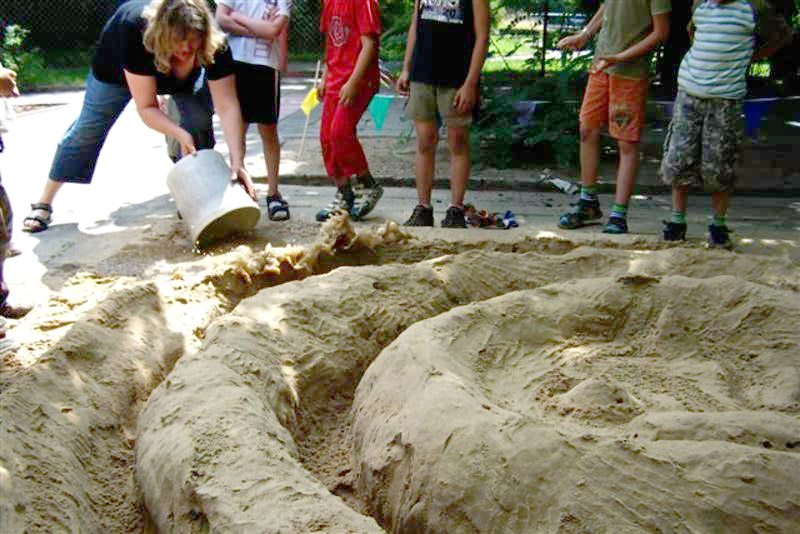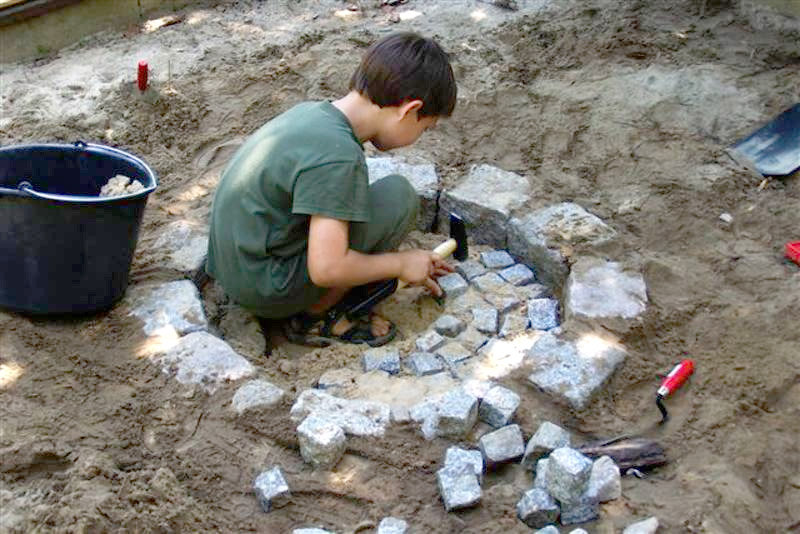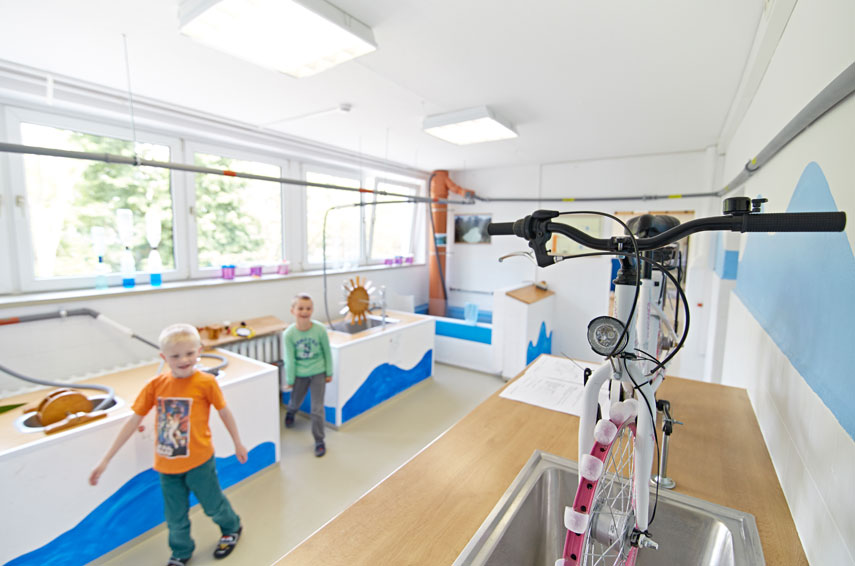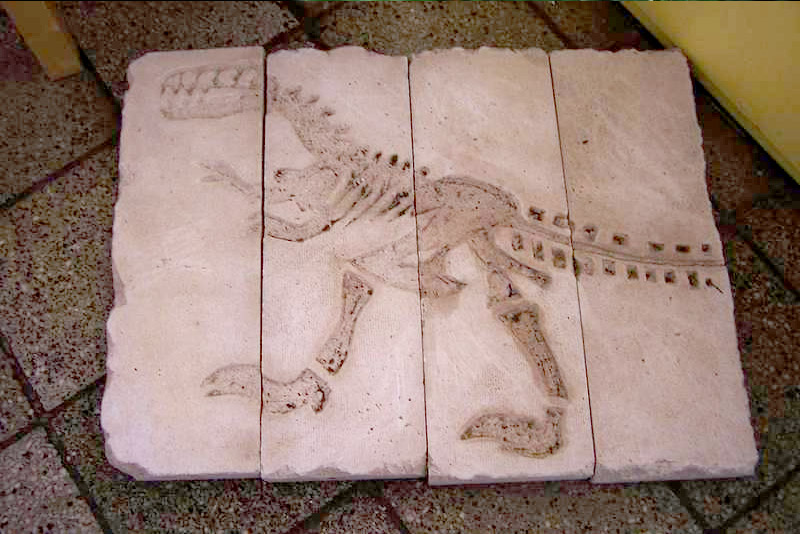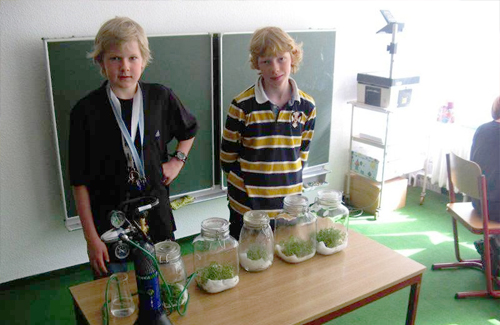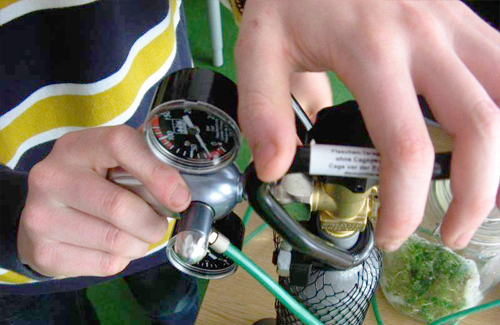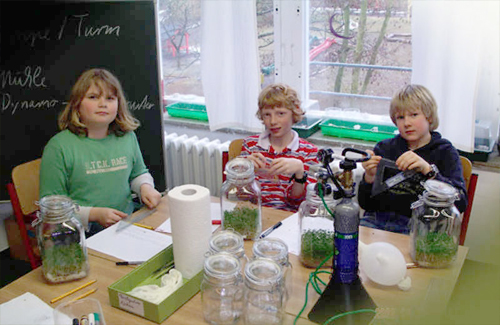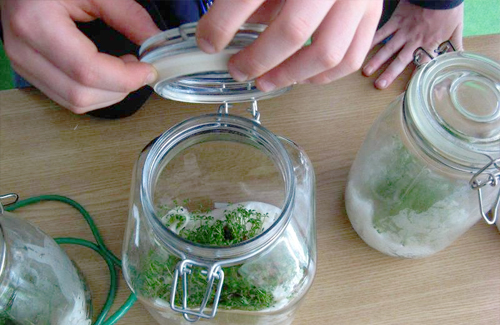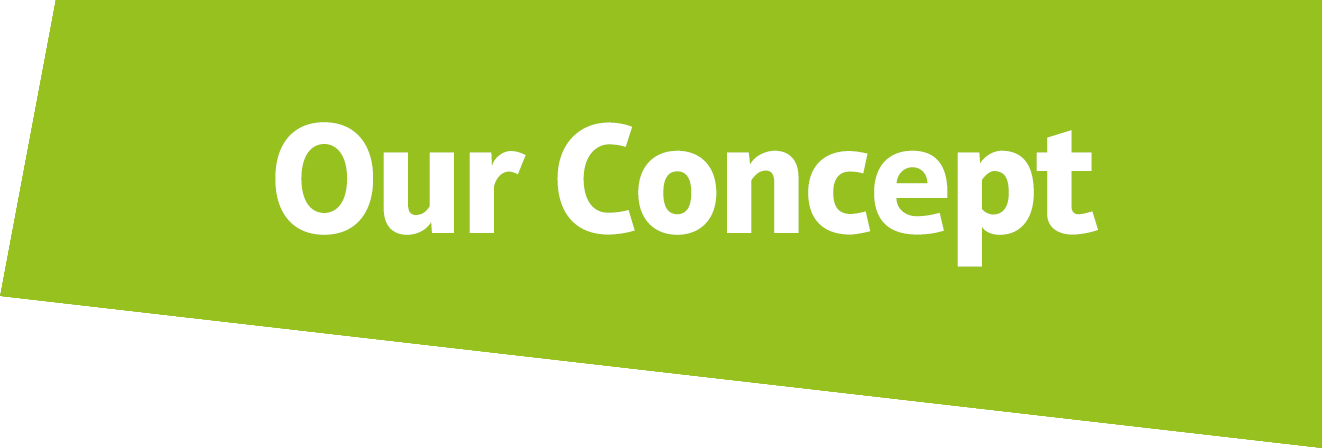
What is KEA?
At the KidsEnergyAcademy (KEA), children can come into contact with science and technology at an early age. Enthusiasm and interest in scientific phenomena and laws and their implementation and application in everyday life are awakened within the children. Children who are particularly enthusiastic about technology can be challenged and encouraged at KEA.
KEA is particularly focussing on the topic of "renewable energies" as primary school children show great interest in this topic. We also want to establish a connection between local businesses and our educational institution. KEA is divided into an experimental and an interactive exhibition area.
The Energy Exhibition
The exhibition is intended to enable children to make their own experiences, to experiment, to "grasp" phenomena. In 6 exhibition rooms we have paid special attention with experimental setups and display boards to the key topic of our time: "renewable energies".
The StudentLab
In the KEA laboratory, children can experiment independently. The goal is to get young people interested in science and technology, especially in the energy industry, and to give new impulses for class.
Extracurricular science courses, project days and holiday offers
At KEA, children can start research from the age of 5. For groups of children from daycare centers we create special project programs for the morning. For children from day-care centers we offer various scientific extracurricular courses in the afternoon and during the holidays. School classes can book numerous project days according to the framework curriculum as project days with us or as events at their school.
Of course visitors to the interactive exhibition also have the opportunity to do research in the laboratory and discover new things.
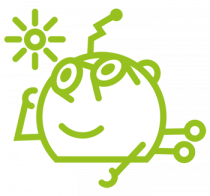
KEA includes a cafeteria with a small kitchen, a lecture hall with a projector, the student laboratory and our 9 interactive exhibition rooms on the topic of "energy".
Extensive playgrounds and green areas enable outdoor activities.
The STUDENT LABORATORY offers the best conditions for experimenting with an entire class, small groups or at individual workstations.
The students have access to modern equipment with work tables made of stainless steel with electricity and water outlets, as well as an extensive laboratory equipment are available!
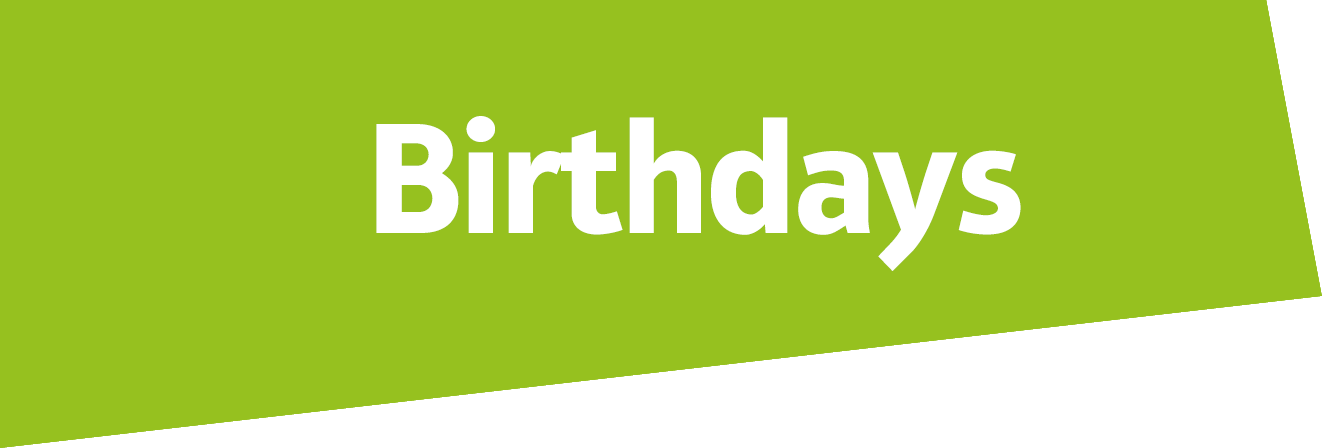
Let´s celebrate!
Celebrate a child's birthday or theme day at the KidsEnergyAcademy (KEA)
The first time you can celebrate with us when you turn 6 years old. Friday through Sunday, from 14:00-15:30 and 16:30-18:00, children up to 12 years old can come for their birthday or like-minded children for a theme day. We have space for groups up to a maximum of 12 children.
During the summer vacation from 18.07.2024 to 31.08.2024 we do not offer birthday parties.
You can spend the whole afternoon with us or just book an activity programme. Each programme is planned by an educational employee of the Kinder Energie Akademie. You will discuss the topic of the research and experiments and the age group with them prior to planning.
You have specific ideas and wishes?
Of course we can also plan the project topic according to your individual wishes. We charge an additional fee of 20 Euro for the additional planning service.
In addition to the research and experiments in the children's research laboratory, the children get to play outdoors and/or watch a film at KEA's children's cinema.


How do you want to celebrate?
- In the realm of the primeval monsters (dinosaurs)
- The earth spews smoldering stones (volcanoes)
- Flight through distant galaxies (rockets)
- LEGO Team (Building and Design)
- Noble and chic (jewelry design)
- Cooking laboratory (baking and cooking)
- The 4 elements (tests and experiments)
- Star Wars (fan birthday)
- The Three Investigators (criminalistics)
- The UFO Landing (Alien)
- Pirate Birthday
- Wellness for girls (cosmetics)
- The world of colors (plant colors)
- The "do-it-yourselfers" (old craftsmanship - batik, soap, printing, calligraphy)
- Experiments in the children's research laboratory (everyday phenomena)
The action part
135€/1,5h (max. 10 children) each additional child 14€ (Surcharge for weekends/holidays €20)
Time for discovery. Research, experiment, build and tinker. The activity programme is planned by an educational employee of the Kinder Energie Akademie. For this purpose, you will discuss the topic of the research and experiment programme as well as the age group of the children with them prior to planning.
Our gift for the birthday child
The birthday child receives a KEA research bag! What's in it? Shh...secret!
Registration & Info
Reservations by telephone need to be at least 7 days in advance! KEA will open its doors 30 minutes early if you book the cafeteria. If you come for the activity programme only, you and the children may arrive 10 minutes before it starts. Please make sure you leave the cafeteria on time.

The HolidayCollege
Children who want to experience exciting and interesting things during their holidays can attend a challenging weekly programme on various topics.
Each college week is led by 2 lecturers. The team is supported by an additional guest lecturer.
Parental involvement
The intensive cooperation between parents and course leaders is an essential feature of the KinderCollege as well. By pointing out your child's special interests and curiosity, you actively decide on the topics and contents of the college weeks and thus help to pick up your child's ideas and to shape them constructively.
CollegePlan 2026
Booked out? Feel free to send us a message if you want us to put you on the waiting list.
-
EasterCAMP 07.-10.04.2026
Tuesday-Friday / 250 €The Overnight Camp Week at the ForscherCAMP
Chilling, listening to music and hanging out included!
Up for a week full of fun, relaxing, music and good vibes? Then join this year’s Easter CAMP with the theme: Careers!
Together, we’ll explore different worlds of work and try out what might suit you best:
In the lab, you’ll create your own creams; as astronomers, you’ll observe stars through a telescope; in journalism, you’ll produce articles and short videos; as biologists, you’ll mix natural paints; and in the outdoor cooking studio, you can try your hand at being a chef. Of course, there will be plenty of time for fun, music and cozy chill moments.Discover your strengths, collect “aha” moments – and maybe even find your future dream job!
Participation from 5th to 8th grade possible!
-
WeekendCAMP 05.-07.06.2026
Friday-Sunday / 120 €The Overnight Camp Weekend at the ForscherCAMP
In the footsteps of the little heroes
Get ready to dive into the exciting world of insects at the CAMP weekend at Lake Helenesee! Become an insect researcher and discover what’s crawling, buzzing and full of action right outside.
Together, we’ll build and design insect hotels and wooden cubes, drill, dye with beetroot, create insect watering stations and make colorful flower bombs. Armed with our magnifying glasses, we’ll head out on an insect safari to discover what can be found within just one square meter of nature.
Costs incl. materials and catering from Friday 4.00 pm to Sunday 3.00 pm.
Participation is possible for primary school children from Year 1!
-
WeekendCAMP 19.-21.06.2026
Friday-Sunday / 120 €The Overnight Camp Weekend at the ForscherCAMP
Exploring the world of stone and earth
At the CAMP weekend at Lake Helenesee, the exciting world of geology is waiting for you! Discover how stones and soil shape our world and become a rock expert yourself.
Together, we’ll carve soapstone, create colorful earth pigments, play cool stone games like pyramid building or a handmade stone memory game, build volcanoes and tinker with a natural stone balance. Along the way, you’ll learn about the secrets of rocks, soil and volcanoes in a fun and playful way.
Costs incl. materials and catering from Friday 4.00 pm to Sunday 3.00 pm.
Participation is possible for primary school children from Year 1!
-
WeekendCAMP 26.-28.06.2026
Friday-Sunday / 120 €The 4 elements
Overnight camp in the ForscherCAMP
Have fun in the camp directly at the “Helenesee” with the traditional activities:
Get ready for an unforgettable adventure! At the “4 Elements” weekend camp at the research camp on Lake Helene, you can experience and explore the fascinating forces of earth, water, fire and air up close.
Discover the secrets of soil, learn how water makes life possible, explore the energy of fire and how to handle it safely and feel the invisible power of air. Look forward to a weekend full of fun, action and fascinating discoveries where you can explore and experiment with the forces of nature.Costs incl. materials and catering from Friday 4.00 pm to Sunday 3.00 pm.
Participation is possible for primary school children from Year 1!
-
1. SummerCAMP 09.-13.07.2026
Friday-Sunday / 320 €A Full Overnight Week of Art, Play and Fun awaits you at the Summer CAMP at Lake Helenesee!
Spend an entire overnight week full of creativity, games and fun at the Summer CAMP at Lake Helenesee! Right at the ForscherCAMP tent site, you’ll have the chance to express your creativity and work together with others on exciting projects.
Alongside classic camp activities such as a water play area to cool off, bike tours, adventure-based learning, outdoor games, campfires, crafting and painting, you can look forward to special artistic highlights:
-
Sculpture building – create your own artworks from a variety of materials
-
Nature relief art – design three-dimensional artworks using natural materials
-
Poster art / Pop Art – design colorful posters in a trendy style
-
Street art – try out cool spraying and graffiti techniques
Of course, there’s plenty of movement, play and fun as well: from active and chaos games, Helene Bingo and soccer tournaments to the legendary camp show – it’s all part of the experience!
Participation is possible for primary school children from grade 1!
-
-
2. SummerCAMP 20.-24.07.2026
Monday-Friday / 320 €A Full Overnight Week of Art, Play and Fun awaits you at the Summer CAMP at Lake Helenesee!
Spend an entire overnight week full of creativity, games and fun at the Summer CAMP at Lake Helenesee! Right at the ForscherCAMP tent site, you’ll have the chance to express your creativity and work together with others on exciting projects.
Alongside classic camp activities such as a water play area to cool off, bike tours, adventure-based learning, outdoor games, campfires, crafting and painting, you can look forward to special artistic highlights:
-
Sculpture building – create your own artworks from a variety of materials
-
Nature relief art – design three-dimensional artworks using natural materials
-
Poster art / Pop Art – design colorful posters in a trendy style
-
Street art – try out cool spraying and graffiti techniques
Of course, there’s plenty of movement, play and fun as well: from active and chaos games, Helene Bingo and soccer tournaments to the legendary camp show – it’s all part of the experience!
Participation is possible for primary school children from grade 1!
-
-
3. SummerCAMP 27.-31.07.2026
Monday-Friday / 320 €A Full Overnight Week of Art, Play and Fun awaits you at the Summer CAMP at Lake Helenesee!
Spend an entire overnight week full of creativity, games and fun at the Summer CAMP at Lake Helenesee! Right at the ForscherCAMP tent site, you’ll have the chance to express your creativity and work together with others on exciting projects.
Alongside classic camp activities such as a water play area to cool off, bike tours, adventure-based learning, outdoor games, campfires, crafting and painting, you can look forward to special artistic highlights:
-
Sculpture building – create your own artworks from a variety of materials
-
Nature relief art – design three-dimensional artworks using natural materials
-
Poster art / Pop Art – design colorful posters in a trendy style
-
Street art – try out cool spraying and graffiti techniques
Of course, there’s plenty of movement, play and fun as well: from active and chaos games, Helene Bingo and soccer tournaments to the legendary camp show – it’s all part of the experience!
Participation is possible for primary school children from grade 1!
-
-
4. SummerCAMP 03.-07.08.2026
Monday-Friday / 320 €A Full Overnight Week of Art, Play and Fun awaits you at the Summer CAMP at Lake Helenesee!
Spend an entire overnight week full of creativity, games and fun at the Summer CAMP at Lake Helenesee! Right at the ForscherCAMP tent site, you’ll have the chance to express your creativity and work together with others on exciting projects.
Alongside classic camp activities such as a water play area to cool off, bike tours, adventure-based learning, outdoor games, campfires, crafting and painting, you can look forward to special artistic highlights:
-
Sculpture building – create your own artworks from a variety of materials
-
Nature relief art – design three-dimensional artworks using natural materials
-
Poster art / Pop Art – design colorful posters in a trendy style
-
Street art – try out cool spraying and graffiti techniques
Of course, there’s plenty of movement, play and fun as well: from active and chaos games, Helene Bingo and soccer tournaments to the legendary camp show – it’s all part of the experience!
Participation is possible for primary school children from grade 1!
-
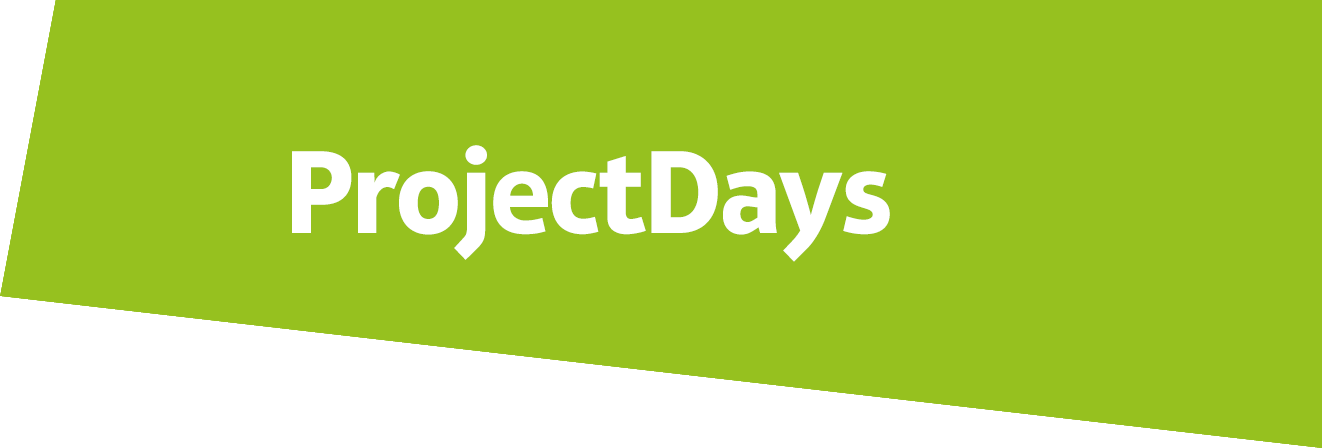
Field days & curriculum-oriented project days for school classes
In our well-equipped rooms you can attend various courses with your primary school class according to the curriculum. We orientate ourselves on the framework plan of the elementary school of the state of Brandenburg and thus guarantee the implementation of the required educational and training principles.
We place great emphasis on taking up the specific experiences of each individual child and the individual challenge and support of all students. Our programme intents to impart the competences to act. The focus is on the development of material and methodological skills as well as the development of social and personal competences.
Devided by subject and grade, you can individually select the content that will be taught on the project day. When organizing the project days, we implement the quality features of the elementary school's framework curriculum to structure each lesson:
- Develop independence and personal responsibility
- Consider the individuality of the students
- Promoting cooperation
- Instruction and construction
- Facilitate situated and systematic learning
- Develop problem-oriented tasks
- Consider errors as learning steps
- Enabling cumulative learning
- Teaching that is subject-related, interdisciplinary, and cross-curricular
- Include media and give rhythm to lessons
Structure of a ProjectDay
- Brainstorming
- Working in small groups
- Presentation of the results in the plenum
- Documentation of the results on worksheets, flipcharts or wall newspapers
A project day always consists of the following modules:
- Experimenting in the Children's Research Laboratory
- Working in the lecture room with media support
- Snack break in the cafeteria
- Exercise outdoors
The project days are planned and executed by the KEA team. The programme is according to the educational standards set by the Conference of Ministers of Education and Cultural Affairs. The teachers have been working at the "EinSteinchen" since 2009 and offer project days for school classes, numerous science courses in the afternoons and college events during the holidays for pre-school and primary school children.

FieldDays & ProjectDays
Costs
Project time 9.00 - 12.00 (including break) with 2 KEA employees including all necessary materials: 130 €
Max. 20 children, each additional child 6,50 €
Free beverage supply during the entire project!
Lunch snack (optional) 3,00 € p.p.
Capacity
30 primary school childrenOpening hours for schools
Monday to Friday 8.00 am to 12.00 noon by appointment onlyTopics for grade 1 and 2
Health Promotion
Testing and describing the performance of the senses.
Objective
The students are able to describe all senses and their performance. They experimentally and playfully test the performance of the individual sensory organs.
Content
- Knowledge transfer and processing AB "Seeing, hearing, tasting, feeling, smelling
- Experiment "Taste"
- Perception games for smelling and hearing
- The five human senses (DVD)
Health Promotion
name, distinguish and compare selected plants
Objective
The students are able to name different early blossoming plants and point out characteristics of different plants. They document their observations and present their results to the group.
Content
- Knowledge transfer early bloomers
- Research in the laboratory and creation of plant fact sheets
- NABU-Quiz "Experienced Spring"
- Early bloomers (DVD)
Objective
The students are able to measure and interpret the temperature correctly. They recognize different weather symbols and can document weather phenomena.
Content
- Knowledge transfer of weather phenomena
- Research in the children's laboratory - measuring and documenting temperature
- Create a weather map and weather forecast
- What is What (DVD)
Objective
The students know different properties of water. In the laboratory they apply their theoretical knowledge in practical experiments. They prepare a complete test protocol and present their results to the group.
Content
- Exploring of the research question: Is water wet?
- Experiment Tasting and smelling / test protocol
- Test Optical properties
- "Wissen macht Ah!": Water (DVD)
Objective
The students are able to explain the connection between water and life. They can point out the effects of water shortage. They are able to name the different functions of water.
Content
- Knowledge transfer and quiz "Dealing with water in the household
- Long-term experiment for the window sill
- Construction of a mini aquarium / pond
- DVD Unicef "A drop of water
Objective
Pupils are to determine through experiments that materials either float or sink. Children recognize that the same materials behave differently on the water depending on form.
Content
- Knowledge transfer and explanation "Why do ships swim?
- Building your own boat hulls from different materials
- Test of the boats in the children's laboratory / test protocol
- What is What DVD Ships
Objective
Students are able to name the characteristics of fire. They can state possibilities of utilizing fire. In simple experiments they learn the proper use of matches and candles.
Content
- Knowledge transfer for light and heat
- Experiments in the children's laboratory
- Fire protection education
- DVD "Willi wants to know" fire department
Objective
The students are able to create a building section with different functional rooms according to a specification. They are able to make a simple sketch and build a simple model.
Content
- Knowledge Round Table
- Draft of an idea
- Construction of a cardboard model
- DVD WWW - Who finishes house construction?
Topics for grade 3 and 4
Objectives: The interest of the pupils in scientific experiments and phenomena is to be stabilised. Phenomena should be recognized and understood as such. The students know the definition of sound.
Content: >> AB Sound >> sound organ >> sound experiments in the children's laboratory >> DVD Sound and hearing
Objective: Students will experience and understand optical phenomena. They will learn about the components of the eye. They know what a visual stimulus is and apply their knowledge in experiments.
Contents: >> AB Eye >> Optical experiments >> Building a mirror cabinet >> DVD Eye and Optical Sens
Objective: Students will learn about the power of magnets, understand them and understand their occurrence in everyday life. They will learn about the properties of magnets. They will experiment with magnets.
Contents: >> AB Poles >> Expriments with magnets >> Building a magnetic spinning top >> DVD Film (Magnetism)
Objective: The students look for solutions and deal with the environment in an active, explorative way. They experience that spatial perception also includes sensory experiences and can name the individual senses.
Contents: >> AB Space and senses >> Experiments on spatial perception >> Model making >> DVD Senses
Objective: Students experience temporal processes in nature that are evident in the cycle in nature or in human life. They understand the constant recurrence of seasons and understand the process of growth and decay. They recognize that time must be regarded as something irreversible and cannot be influenced.
Topics for grade 5 and 6
Objective
Pupils know what "shadow" is. They are able to understand the interplay between light and shadow.
Content
- Knowledge transfer and processing AB Constructing shadows
- Experiments in the school laboratory "Large and small shadows"
- DVD "Light and shadow"
Objective
Pupils understand what electricity is and know how it is generated and what it is used for. Pupils recognize which objects conduct electricity and which do not.
Content
- Knowledge transfer and processing AB Electricity circuit
- Experiment in the student lab "What conducts electricity"
- Morse code application using a built circuit
- DVD "Electricity"
Objective
The pupils deal with the power of magnets. They learn to understand them, understand their occurrence in everyday life and explore the Earth's magnetic field in the school laboratory.
Content
- Building a compass
- Experiment in the student laboratory "The floating paper clip"
- Magnetic conductivity of different materials
- Experiment "The crazy labyrinth"
Describe relationships between structure and function and adaptation to habitats
Objective
Pupils are able to use simple experiments to demonstrate that living organisms adapt to their habitat in order to increase their chances of survival. They recognize the connection between body structure and functionality.
Content
- Knowledge transfer and quiz "Records in the animal kingdom"
- Experiments with webbed feet and air bubbles
- Buoyancy experiments
- DVD The human marvel
Objective
Pupils put their own sensory organ, the skin, to the test and explore its possibilities and limitations. Using simple examples, they recognize that perceptions can be deceived.
Content
- Knowledge transfer and processing AB Skin - Pressure sensation
- Experiments on the sense of touch - Braille
- Evaluation and presentation of the results
- DVD "The realm of the senses"
Objective
The students know what "sound" is. They are able to name the connection between noise and hearing damage.
Content
- Knowledge transfer and processing AB "Ear"
- Experiments in the research laboratory
- Noise Quiz
- DVD "Crime scene: Ear"
Objective
The students can name and show the taste zones of the tongue. The students can understand the connection between smelling and tasting.
Content
- Knowledge transfer "taste buds"
- Try "Is it salty, hot, sweet and sour"
- Test protocol
- Experiment " "Deceiving senses" Nose and tongue experiment
- DVD "The senses - a complete world of wonders"
Objective
The students put their own sensory organ, their skin, to the test and explore its possibilities and limits. They recognize from simple examples that perception can be deceived.
Content
- Knowledge transfer and processing AB "Skin and sense of touch"
- Station learning / experiments on the sense of touch
- Evaluation and presentation of the results
- DVD "Senses Discovery
Objective
The students experiment with light and are able to apply the findings to the construction of various optical devices. They are able to build a pinhole camera and explain how it works.
Content
- Knowledge transfer by means of experiments and tests (light/shadow, optical illusion, inertia of the eye)
- Experiment in the laboratory for light reflection and preparation of measurement data protocol
- Construction pinhole camera
- DVD Panoptikum.net
Mathematics & Biology
Objective
The students "recognize and describe geometric structures in the environment", operate mentally with lines, surfaces and bodies »can sort plane figures according to properties and assign technical terms.
Content
- Mathematical treasure hunt
- Powerball with formulas
- Puzzle
- All kinds of formulas
- Mathematical quintet (lengths)
Objective
The students use the basic principle of measuring in non-mathematical areas, select units of quantities according to the situation (especially for time, mass, money, length) and convert them. They estimate quantities with the help of ideas about suitable representatives of everyday life, take targeted measurements in their environment, take measurements from source material, and thus perform calculations and evaluate the results.
Content
- Size quiz and estimation marathon
- Building measuring instruments
- AB Measuring
- DVD "From Counting Stone to Computer - Middle Ages
- Mathematics in history
Objective
The students experience the world of numbers as tangible, applicable everyday events. They are able to apply the knowledge gained in familiar situations.
Content
The individual numbers are displayed at 12 stations. For example, we clarify the questions: Why the Sunday is called "Sunday", why the 12 is a cult number and why October is called "October" although it is not the eighth month! For example, the children recognize that a ball is only round thanks to the pentagons between the hexagons.
Objective
The students are able to give stability to different materials through individual shaping and draw conclusions about the connection between form and stability.
Content
- Knowledge transfer by means of different experiments
- AB Shape and stability
- Bridge construction - sketch and model
- DVD bridges - NZZ format (DVD)
Food - Energy and nutrition providers
Objective
Students can name various starchy plants and foods. They are able to detect starch in plants.
Content
- Knowledge transfer of energy and nutrition providers
- Detection of starch and protocol in the laboratory
- Test: Digestion of starch in the mouth
- DVD Nutrition
How plants breathe - describing substance and energy conversion processes
Objective
The students see and understand that a plant produces a gas which is very important for us. The independent way of working stimulates the students to think about their own ideas.
Content
- Knowledge transfer material conversion
- Gas experiments in the research laboratory
- Priestley's experiment
- DVD Photosynthesis
Group living beings after characteristics - botany
Objective
The students can determine different plant families. They are able to create a herbarium.
Content
- Knowledge transfer biotope plant world pond / bank
- Excursion to the locomotive bath / collecting plants
- Construction of a plant press
- Creating a herbarium
- DVD botany (FWA)
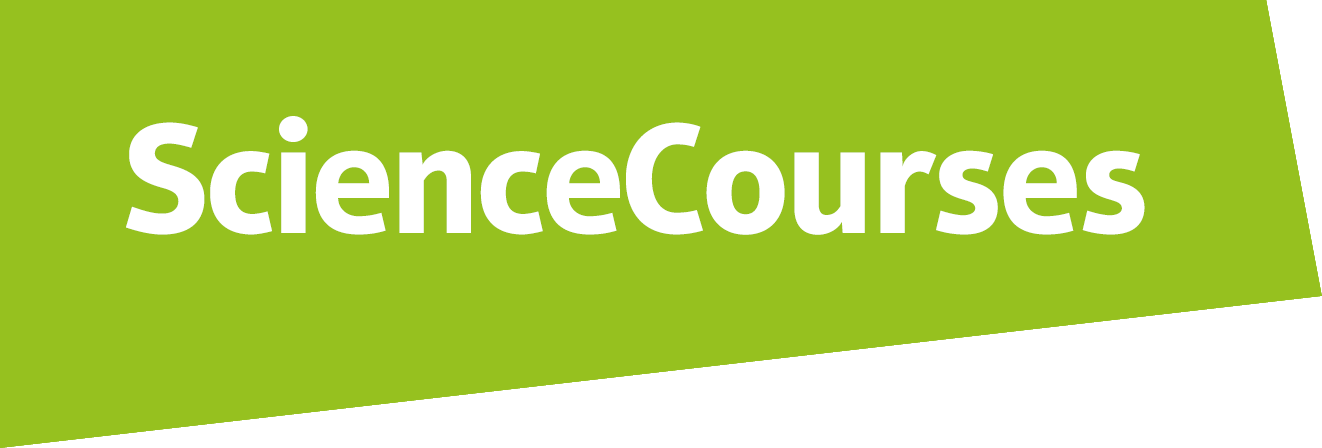
Bored?
Not with us!
Science courses for pre-school and primary school children
We offer various courses in the afternoon throughout the school year. Children who want to experience exciting and interesting things in their free time can attend a challenging course program on various topics.
The individualization of learning processes is very important - for highly interested and talented children, positive group experiences are equally important. To achieve this, they always need same leveled developed, i.e. significantly older and peer-aged, but also similarily interested and talented - playmates.
Only in this way can they repeatedly gain the valuable experience of successfully realizing their often complex play ideas together with other children and intensively discussing questions of interest.
In all courses we realize a personnel key of maximum 8 participants per teacher.
Costs
The extracurricular courses cost 50 euros/month, including materials and beverages.
Parental involvement
The continuous, intensive cooperation between parents and course instructors is an essential feature of the leisure courses. Project work should be developed by the children themselves. In doing so, the children's interests and family environment play an important role. Support the content of the recreational courses and help to strengthen and expand your children's ideas.
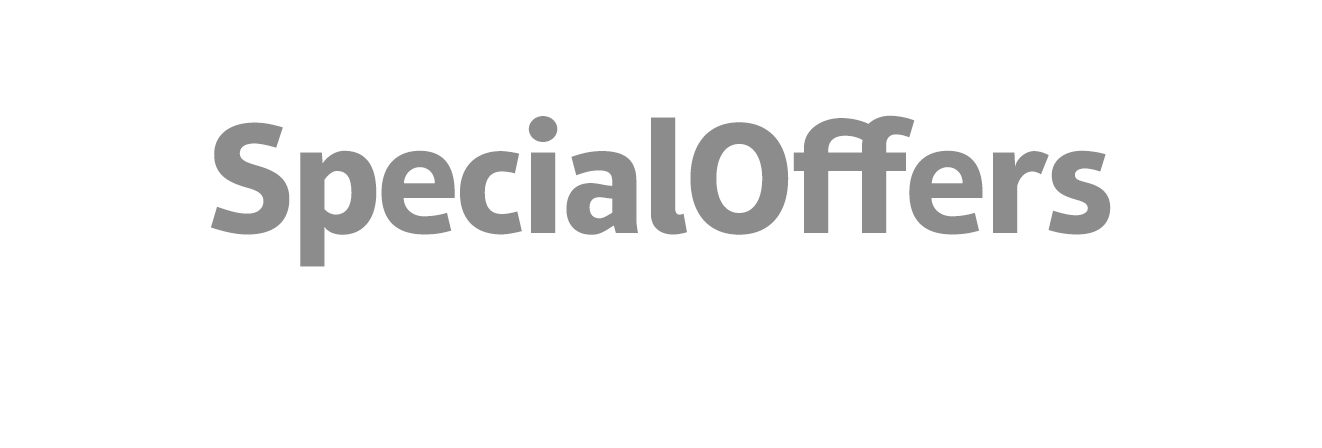
KEA-Courses for pre-school and primary school children
Together with educators, parents and teachers, we have designed a preparatory course for children starting school, which does not focus on acquiring knowledge, but on teaching and practicing the necessary social skills for starting school. In the course, the children can optimally adjust to the changes that the start of school brings with it in an appropriate school environment (classroom, lesson/break rhythm, other children and teachers).
The aim is to support your child in tackling new tasks, dealing with failure and not despairing in the process, but rather looking for solutions to problems with the help of their individual strengths and resources in order to gain self-confidence and get to know themselves through experiences of success. In role-playing games, experimenting and researching, on the excursion and in everyday course situations, the children develop the following topics in a playful way:
- How do I deal with new situations that I don't know yet?
- How do I make friends in a new group of children?
- What do I do when I'm scared?
- How do I behave when there is an argument?
- What do I do if I don't understand a task?
- What am I really good at and where do I still need support?
annual contract / 1h per week / for preschoolers in the last year of KITA
LABORATORY course I tuesday 15:00 - 16:00 / Price 50€ per month
Taking part in the lab course encourages your child to take on new challenges and allows them to be flexible in unfamiliar situations without being exposed to the stress of school. A balance of varied challenges on the one hand, and fun, joy and pleasure in playing with new friends on the other, helps your child to work with perseverance and concentration and to enjoy learning.
The concept: We encourage your child to perceive their environment with all their senses, to use their childlike curiosity and thirst for adventure to understand and comprehend the world. We support your child in tackling new tasks and challenge them to gain self-confidence through experiences of success.
- LEARNING, observing, discovering, researching, understanding, recognizing, grasping
- DEVELOPING SOCIAL COMPETENCES, teamwork, helping each other
- RESEARCH, experiments, cooking and baking, constructing, building
annual contract / 1h per week / for primary school pupils of the 1st and 2nd class
tuesday 16:30 - 17:30 / Price 50€ monthly
Natural Science Live is an experimental course for primary school children who are curious and interested in science.
The concept: In our school lab, the children research as little biologists and chemists, physicists and astronomers, mathematicians and computer scientists, and can find answers to their questions with confidence, using their individual strengths and resources. The focus is on free experimentation and trying things out.
Annual contract / 1h per week / open for all primary school children from the 3rd grade on
wednesday 15:30 - 16:30 / Price 50€ monthly
The preparatory course for entry to grammar school is aimed at primary school pupils in year 6 who want to transfer to grammar school.
In the school laboratory, the children embark on a journey of discovery across the fields of science, crafts, technology, research and art.
The course is characterized by project work. During the course, the children carry out research in the school laboratory and consolidate the methods they have already learned:
- Designing a workspace
- Organizing work materials
- Keeping notebooks and folders
- Using various learning techniques
Our course participants work flexibly on their own, in teams of two or in working groups and practise:
- Arguing and discussing
- Reading and evaluating factual texts
- Preparing and reading tables
- Documenting and analysing results
- Creating test protocols
Further important course contents are:
- Dealing with media:
Flipchart
Pinboard
Overhead projector - Setting up presentations:
Structure
Dramaturgy
Introduction and ending
Basics of gestures
Facial expressions and posture when presenting
Own design
Practical implementation of a presentation
Working on the computer:
Introduction and basics of a PowerPoint presentation
Creating a handout
annual contract / 1h per week / open to all students at 6th grade
wednesday 17:00 - 18:00 / Price 50€ per month
Lego lovers of all ages can give free rein to their creativity and imagination with countless LEGO bricks. With our four sets “Simple Machines LEGO® Education”, there are also numerous tasks and challenges that require precise planning and construction. Patience and dexterity are trained and developed, as well as the ability to compare and match. The course thus creates the best conditions for essential school skills: perseverance, concentration, understanding tasks and finding solutions.
We offer the children the opportunity to experiment and work with the practical tool “Science & Technology”, through which they can learn about basic mechanical principles and motorized machines, and gain important insights into mathematical, scientific and technical contexts.
The aim is to introduce the course participants to the basic principles of constructions, machines and mechanisms.
They experiment with forces and friction, and investigate quantities such as distance, time, speed, mass, force and many more.
We learn and apply social skills through teamwork.
- Planning together
- Coordinating
- Sharing in solidarity
- Looking for solutions together when we fail
- Celebrating successes as a team
annual contract / 1h per week / open for all Lego lovers
thursday 15:00 -16:00 / Price 50€ per month
PaintPlace is a course that provides space for creativity and artistic development.
Immerse yourself in the world of painting, drawing and design. At the PaintPlace, we bring your creativity to life – whether in the creation of sculptures, reliefs or collages.
Get to know the diverse techniques of art and try your hand at designing with different materials.
At PaintPlace, the focus is on experimentation and artistic freedom. You have the opportunity to make your own paints and explore new creative paths. Discover upcycling, give new life to old things and let your imagination run wild!
Together we dive into the world of graffiti and street art, explore textile design and practise creating sketches. But that's not all – we visit exhibitions and meet artists from the region to get inspired and learn from each other.
The PaintPlace is the ideal environment to discover new techniques, express yourself creatively and begin your artistic journey!
annual contract / 1h per week / open to all primary school pupils from Year 3 onwards
thursday 16:30 -16:730 / Price 50€ per month
Preparation course for participation in the Brandenburg regional competition
If you have an exciting idea or question that you would like to explore, then CONTACT us!
"Jugend forscht" (Youth researches) is a nationwide competition for young researchers that promotes special achievements and talents in mathematics, computer science, natural sciences and technology. Students who want to participate must attend at least the 4th grade. Students up to the age of 14 compete in the junior section "Schüler experimentieren" (Students experiment).
The research topic can be worked on alone or in a group (max. 3 members). In "Jugend forscht" and "Schüler experimentieren" the participants choose their own questions, no topics are given. When working on the project topic, the participants must apply scientific, mathematical or technical methods.
The concept: The course is aimed at primary school children who
1. are interested in participating in the competition with an idea or
2. who want to create an idea together with us and our external supervisors.
During the course, the competition participants have access to the contact personell at EinSteinchen, external specialists and a supervisor. The children will find extensive working materials and all the necessary instruments for working on their research topic in the rooms of the Kinder Energie Akademie (KEA). Supervisors and KEA staff ensure that the exhibits are looked after even on days when the student is not on site (e.g. measurements or maintenance, care of experimental setups). We prepare the participant optimally for the competition, design the booth and accompany them to the competition!
In the last 4 years the participants from EinSteinchen have always been extremely successful as winners of the competition!
Project bound individual contracting / course planning by individual arrangement
Professional intensive course with 1:1 supervision / price 12,50 € per hour
The courses will take place if there are at least 8 registrations per course (except Jugend forscht). If more than 12 children register, two courses are offered.
Contact us: 0172 - 64 14 683
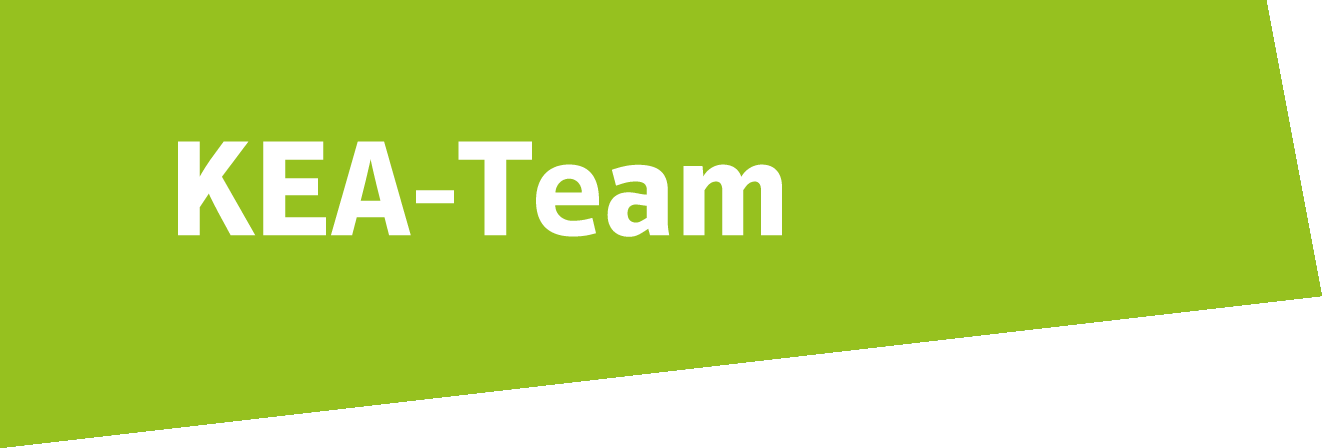
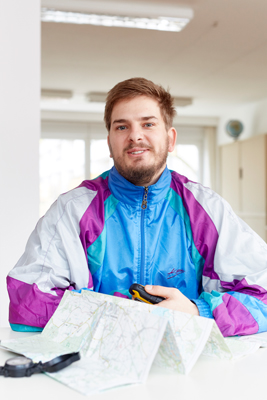
Franz Zecha
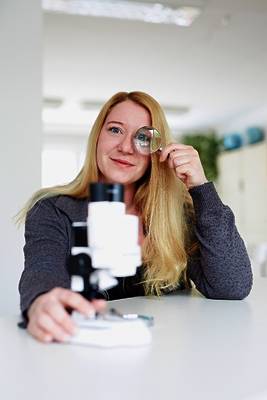
Anne Manglitz
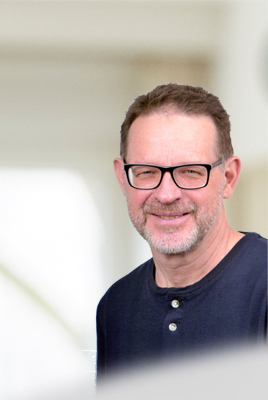
Ole Müller
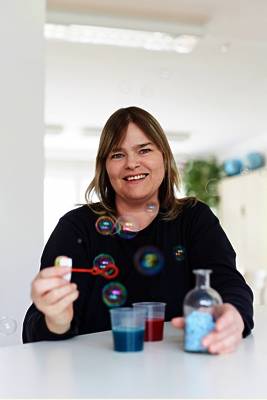
Peggy Zecha
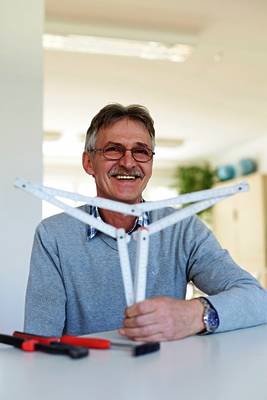
Andreas Koczikowski
